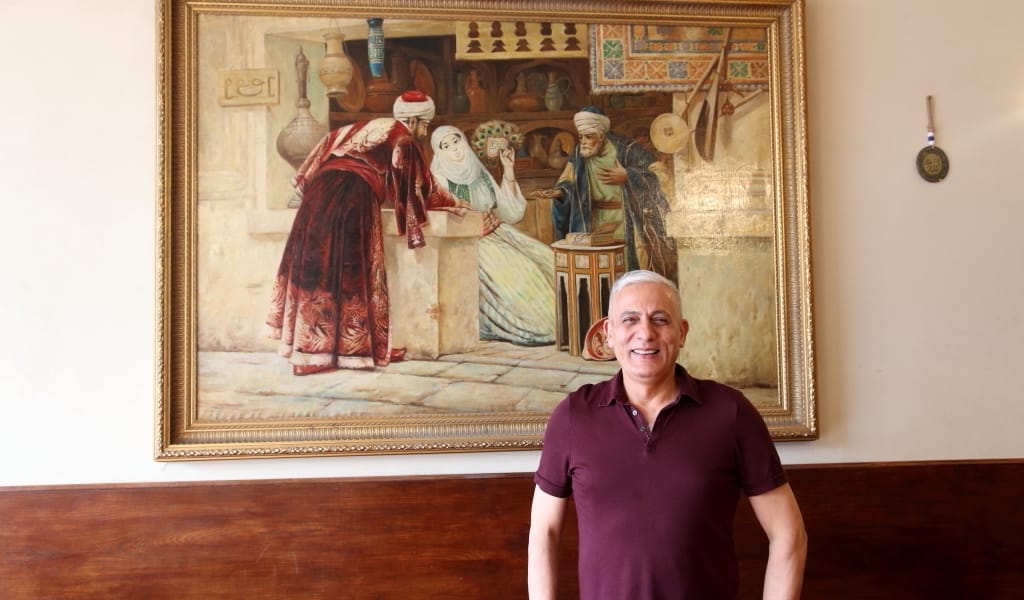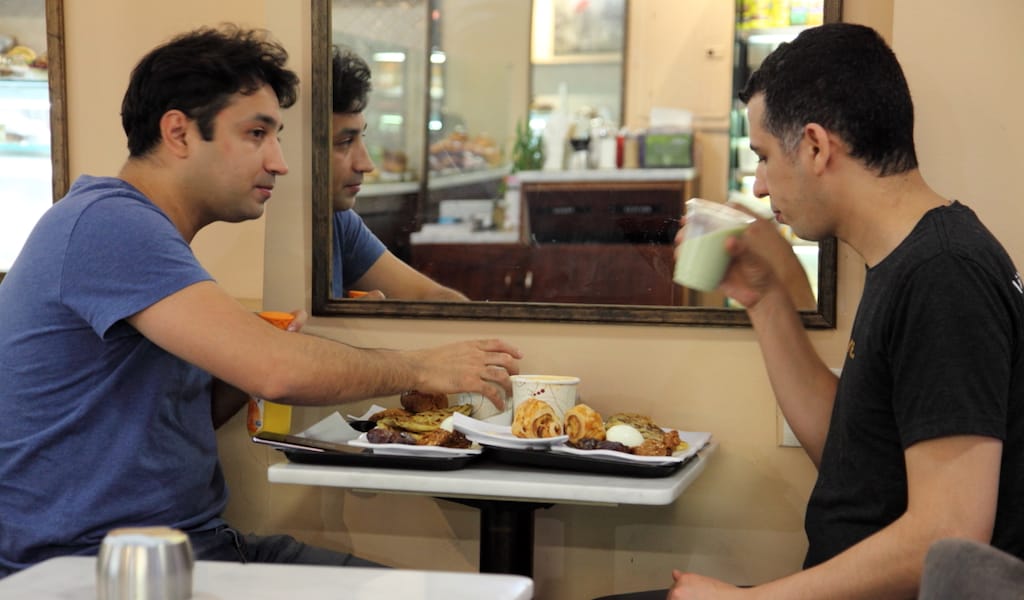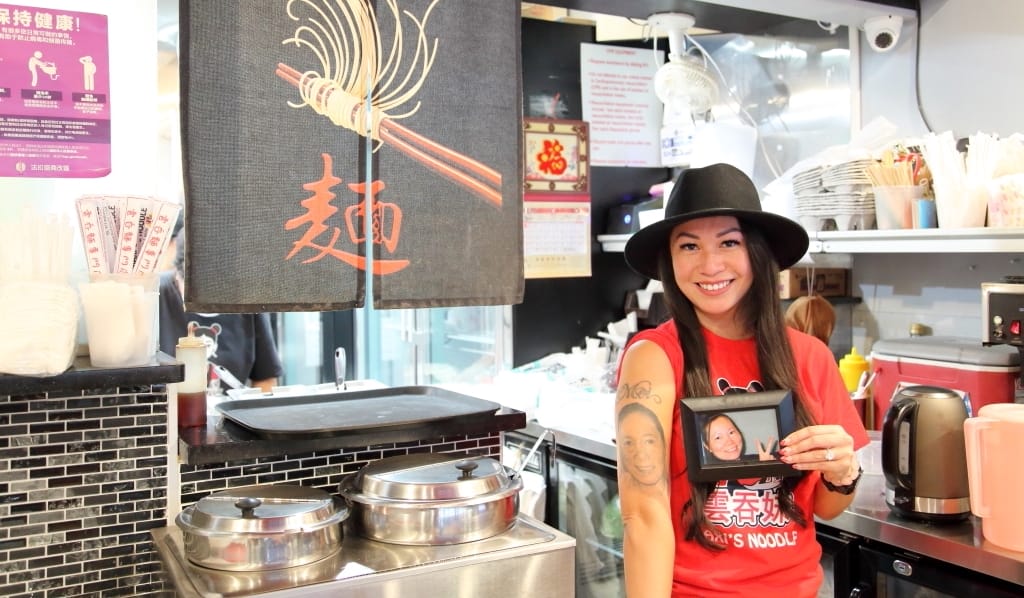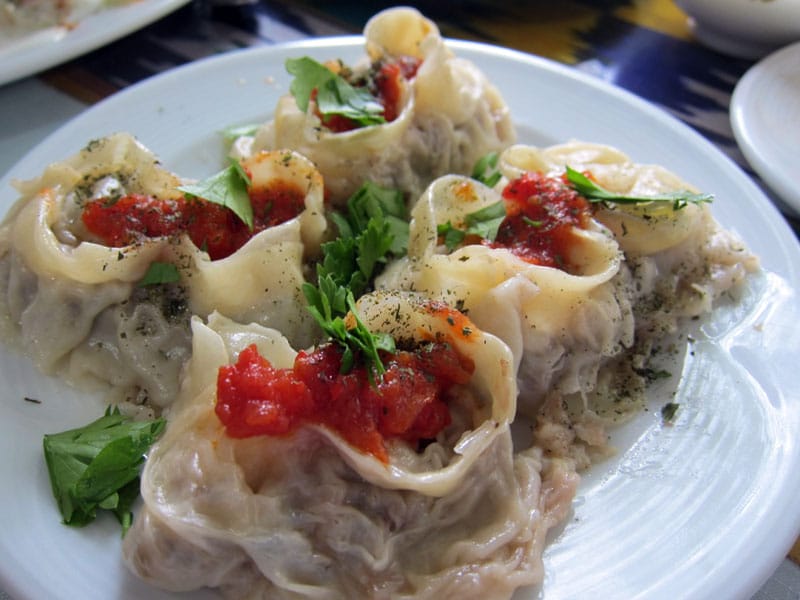Almost before we’d sat down, tea and rice pudding had arrived at our table. “This is the way I was raised,” Sami Zaman explained. We’d arranged a time to speak with him at his namesake Afghan restaurant in Astoria, Sami’s Kabab House, and we’d quickly discovered that refreshments were an essential prelude to our conversation.
Sami is always “working, working, working,” he tells us, but during our visit he also had a smile and a greeting for everyone who stepped into his kabab house. Between spoonfuls of pudding, we asked about the roots of his hospitality.
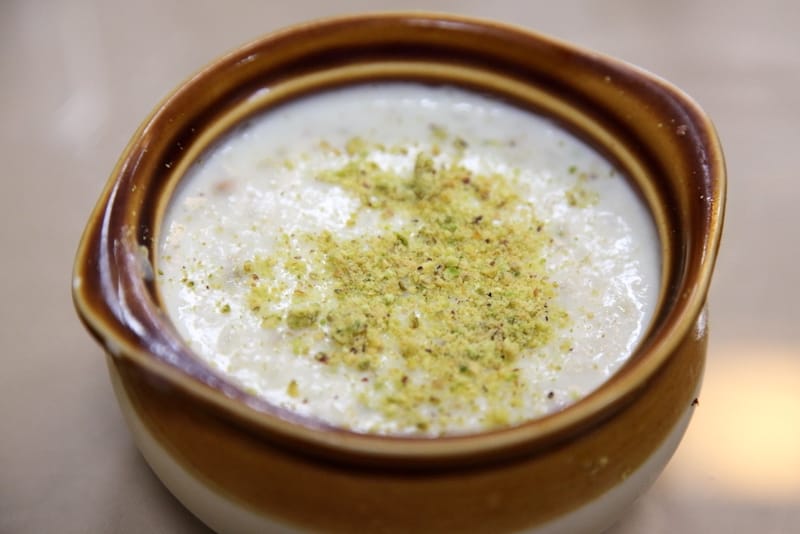
Sami, 55, grew up in Kabul, Afghanistan, as the youngest of 11 siblings, to a Tajik father and Uzbek mother. Of necessity, he learned to help with the cooking for his older siblings – Sami’s father passed at a relatively young age, and his mother worked to support the family.
At the onset of the 1979-1989 Soviet-Afghan War, Sami was not yet in his teens. During the latter half of the war, the family sojourned in Pakistan, first in Peshawar, about 30 miles from the Afghan border, and then in the capital, Islamabad. From there, in 1988 Sami emigrated to the United States – “I’m blessed to be here,” in this “land of opportunity,” he tells us more than once – and to New York City.
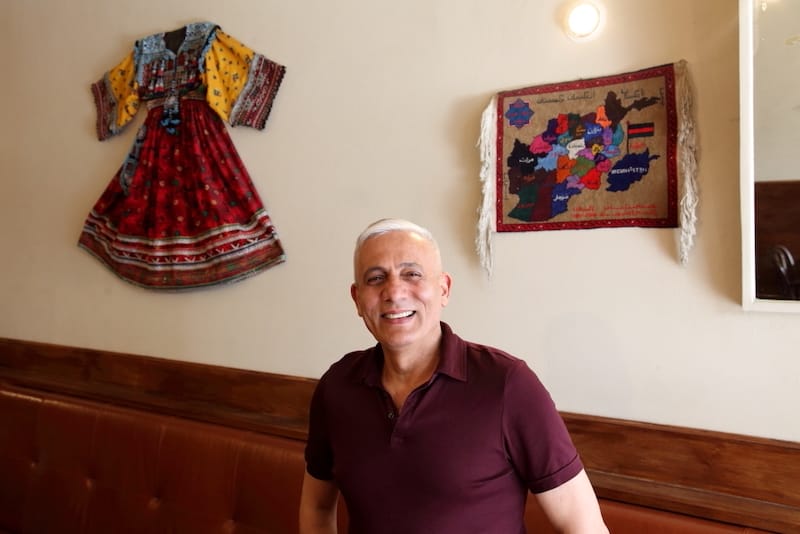
Many of his siblings, too, have emigrated to the States, but not all. Sami still has family ties to Afghanistan, and he’s returned to visit them, now with a wife and four children of his own. But today, he says, there’s “lots of fighting in Afghanistan…people have far fewer chances.” He doesn’t plan to return again during the current, Taliban, rule.
In common with many immigrants to New York City, Sami worked for a time as a street vendor. At his most successful, he operated a pair of coffee-and-donut carts, across the street from each other, near the southern edge of Times Square, in Manhattan. However, after the attacks of September 11, 2001, new security measures in that crowded district meant that Sami couldn’t set up in his usual spots.
He continued selling coffee and donuts where permitted, but he soon found that business was not as good without his established customers. Driving a yellow cab – fortunately, Sami had already obtained his hack license – became a more reliable way to support his family and save for the future.
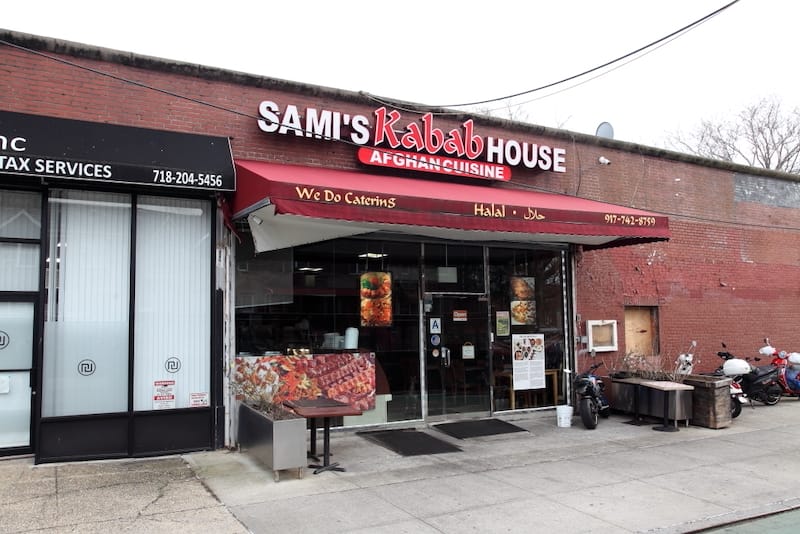
When Sami set his sights on a restaurant of his own, the commercial space he ultimately settled on was “scary.” Not because of the neighborhood, a blend of low-rise residential and commercial properties that’s quiet for New York, except during recess at the school playground across the avenue. What was then a vacant storefront, between a laundry and an accountancy, was falling apart inside. Sami couldn’t tell us anything about the prior tenant, only that he had to build his kabab house “from scratch.”
The simple single-room restaurant that Sami finally opened, in November 2016, shared many decorative touches with his long-ago-home in Kabul: embossed ceiling tiles, tasseled wall hangings and dark, elaborately patterned carpets. A series of good reviews, in the press and on social media, helped the restaurant win a loyal following. In late 2019, Sami was able to enlarge his kabab house with a second, sleeker dining room.
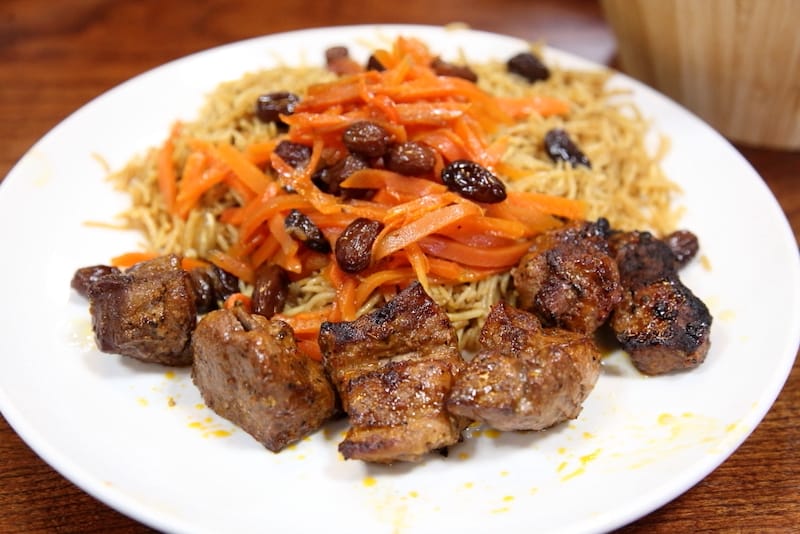
Only a few months later, both dining rooms were empty after the arrival of Covid-19 in Queens. But during the pandemic, “we never closed the door of my restaurant for one minute,” Sami tells us. In addition to takeout orders and deliveries to homebound customers, Sami donated meals to a local hospital through Queens Together, a nonprofit organization that supports local restaurants and food businesses. Founded, in large part, to help feed frontline workers, Queens Together continues to provide relief to people who face food and economic insecurity.
For the sake of the deliverymen, taxi drivers and other workers who helped keep the city running, the restaurant also kept its bathroom open to the public – not a common practice in New York during those early months of the pandemic. As Sami would know from his years as a street vendor and taxi driver, it’s vital for people on the go to have somewhere to go.
New York’s restaurants struggled, and many closed forever, during the darkest days of Covid, but Sami and his family not only persevered but have expanded the business, too. One of his sons, Yusuf, who worked by his father’s side in Astoria, now runs a satellite location in neighboring Long Island City. Sami’s Kabab House LIC, which opened early in 2022, has far fewer seats than the original, but the two restaurants together – a combined father-and-son operation – greatly increases the family’s ability to offer takeout and delivery to the large apartment complexes of Long Island City.
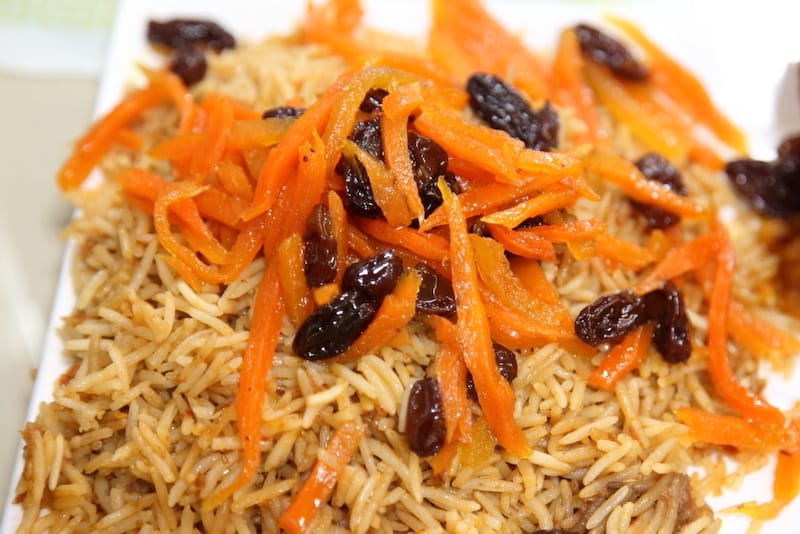
Later in 2022 another son, Ali, opened his own small cafe a block from the kabab house. As at Sami’s old street carts, coffee and donuts are both on offer, but Ali’s coffee beans are sourced from a celebrated Brooklyn craft roaster, and some of the donuts are be filled with the Afghan pudding called firni or flavored with pomegranate and saffron.
Ali also continues to play a part in the family business. When the laundry next door permanently closed during the pandemic, Sami made plans to further expand his restaurant. Ali helped to design a new dining room, Sami tells us, particularly the dramatic arched ceiling. (We got an early look; it’s still under construction.)
Even with all their success, we’re still perfectly happy in the old front room, where today the patterned carpets look even more homey after years of foot traffic, and where the food is reliably good.
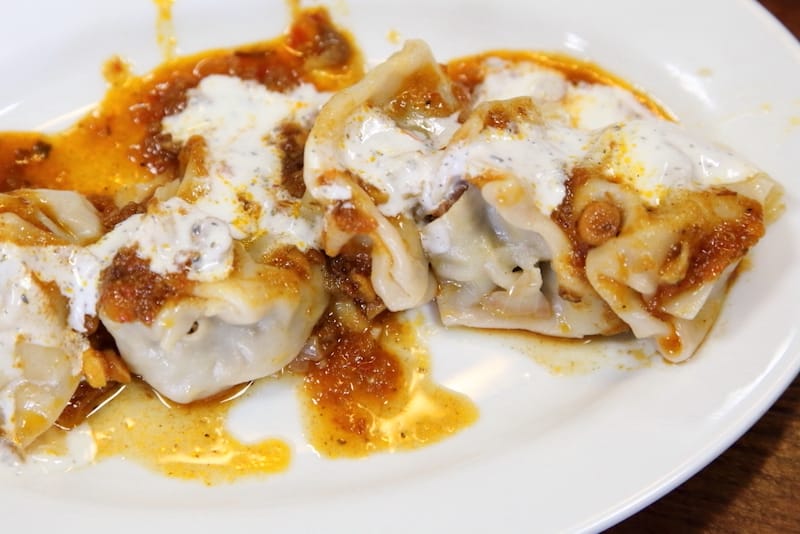
Many of the best-known dishes of Afghanistan, Sami observes, resemble those of neighboring countries along the Silk Routes that long ago connected China and the Mediterranean. The sight of our mantu, for example, called to mind steamed dumplings that we’ve enjoyed at many Central Asian restaurants, but Sami’s are particularly lush.
And our lamb kabab, however tender, would look like many other New York kababs except for the accompanying heap of Qabuli pulao, steamed rice caparisoned in raisins and julienned carrots. The sweetness of the raisins, and especially the carrots, wonderfully complements the fluffiness of the rice and juiciness of the meat. In Afghanistan, lavish versions of Qabuli pulao are prepared for celebratory occasions; in Astoria, we can celebrate whenever we like.
 April 3, 2023 Paris Oven
April 3, 2023 Paris Oven
Back when it was called Noisette, we'd passed by Paris Oven many times in the (not […] Posted in Queens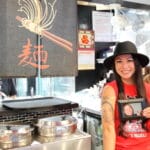 November 25, 2022 Maxi’s Noodle: Just Like Mom’s
November 25, 2022 Maxi’s Noodle: Just Like Mom’s
We're always glad for a second bite at a wonton. At Maxi's Noodle, in Flushing, this […] Posted in Queens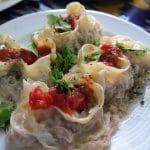 July 1, 2022 Özbek Sofrası
July 1, 2022 Özbek Sofrası
In the former Soviet Central Asian republics, the boilerplate restaurant menu consists […] Posted in Istanbul
Published on April 14, 2023
Related stories
April 3, 2023
QueensBack when it was called Noisette, we'd passed by Paris Oven many times in the (not quite) year that it had been open. But whenever we’d walked down those sometimes clamorous blocks of 30th Avenue in Astoria, Queens – not far from a bagel shop, a pizzeria, a comfort-food hotspot and a New Orleans-themed bar-restaurant,…
November 25, 2022
QueensWe're always glad for a second bite at a wonton. At Maxi's Noodle, in Flushing, this Hong Kong delicacy is notably larger than its Chinese forebears. The dumplings and fish balls at Maxi’s are hefty, too, each large enough to require two delicious bites, if not three. The size wouldn't matter, however, if the wontons…
July 1, 2022
IstanbulIn the former Soviet Central Asian republics, the boilerplate restaurant menu consists of plov, lagman, shashlik and samsa. Tired-looking Uzbek, Kyrgyz, Kazakh and Tajik establishments all serve up the same limp noodles and oily rice with a shrug – it’s their job. In the markets of Samarkand, Osh and Almaty, we found some exciting exceptions…







































